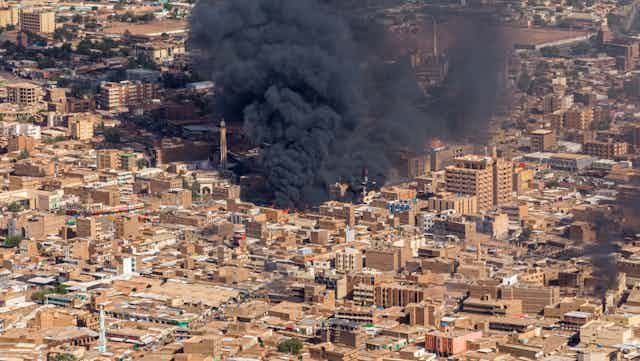At a time when Sudan is witnessing one of the worst humanitarian disasters in its modern history, growing signs indicate that the military leadership has adopted a systematic disinformation approach, intentionally diverting the world’s attention from the atrocities committed against civilians by promoting misleading narratives that do not reflect the reality of suffering on the ground.
This dual strategy employed by the Sudanese army focuses on exporting false narratives abroad, exploiting international platforms not to advance a solution, but to distract attention from its responsibility in prolonging the war and expanding the scope of the tragedy.
Despite the fact that the Sudanese Armed Forces are a direct and primary party to the conflict, they have chosen to use their official facade in international forums to market side narratives, deliberately ignoring documented facts about violations that amount to war crimes.
While these forces should adhere to frameworks of international humanitarian law, the field conduct of their leaders reflects a complete disregard for conventions and ethical standards, as confirmed by United Nations reports, eyewitness testimonies, as well as footage and information gathered by independent human rights organizations.
In repeated and horrifying scenes, field executions carried out by the army in areas it regained from the Rapid Support Forces, particularly in Khartoum and Jabal Awlia, were documented. Civilians were targeted simply for being suspected of sympathizing with the opposing side. The United Nations High Commissioner for Human Rights, Volker Turk, expressed profound shock at these violations, calling on the army to immediately cease these practices, which he described as arbitrary deprivations of life.
It is not only executions that burden the Sudanese army’s record; reliable sources confirm its use of internationally banned weapons, including chemical substances, in attacks on densely populated areas. The New York Times reported that U.S. officials confirmed the use of these weapons on at least one occasion during battles with the Rapid Support Forces, which they described as a dangerous warning of the possibility of this type of weapon being used again in other areas. The European Commission called for an expanded arms embargo to include all of Sudan, but no decisive action has been taken so far.
Amid these violations, it became clear that the military leadership not only seeks to prolong the war, but also aims to internationalize the conflict by striking behind-the-scenes deals with regional and international powers. Intelligence documents revealed that Iran sent weapon shipments to Sudan in March, via a sanctions-violating cargo plane carrying drones and advanced missiles, in exchange for promises of military bases and strategic ports after the war. The Sudanese army, in this context, does not seem concerned with national sovereignty as much as it seeks to secure its survival by dismantling the state from within and plunging it into the game of international alliances.
The irony is that this institution, which speaks of foreign conspiracies and accuses external actors of supporting its adversaries, is itself complicit in introducing foreign weapons and signing security agreements with international powers to resolve the conflict militarily, at the expense of millions of civilians. The statements made by military leader Abdel Fattah al-Burhan and his attempts to bring cases before the International Court of Justice are part of a transparent attempt to appear as a victim while facing personal allegations of committing war crimes. This led the United States to add him to the sanctions list in January 2025 under Executive Order 14098.
The tragedy is compounded by the army’s deliberate obstruction of humanitarian convoys and its imposition of a stranglehold on international aid, which has exacerbated the famine across various regions of Sudan.
United Nations data shows that about 30 million Sudanese are suffering from food insecurity, with nearly 600,000 facing actual famine. A shocking report from Human Rights Watch warned that Sudan is on the brink of “the worst hunger crisis in the world” due to the use of food blockades as a weapon against the population.
All of this is happening while diligent efforts by the international community, led by the United Arab Emirates, aim to establish a political settlement that would return the country to civilian rule. The UAE, which has long been a major humanitarian supporter of Sudan, has provided more than $3.5 billion in aid over the past decade, including $600 million since the outbreak of the current conflict.
However, the military leadership has repeatedly rejected these initiatives, boycotted relevant international conferences, and blocked any attempts to halt the fighting or open safe corridors for aid.
It seems that the Sudanese military is counting on time, using tools of media manipulation and selective diplomacy to gain more immunity from international accountability, while the evidence and documents continue to pile up, which will eventually turn into charges in international courts. The crisis in Sudan is no longer just an internal conflict between armed factions but has become a major humanitarian catastrophe, demanding a more resolute international response to stop the bloodshed and restore the Sudanese people’s right to life and dignity.
